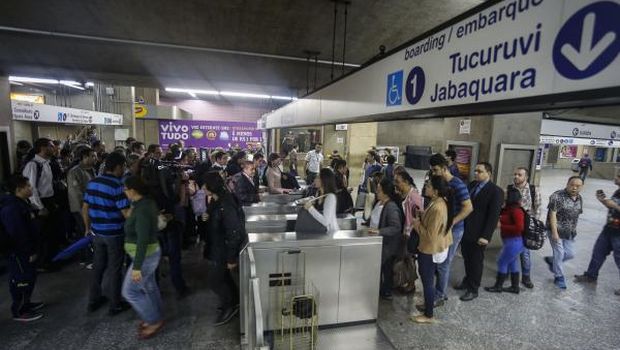
Commuters are seen at the Ana Rosa station during a Metro workers’ strike, in Sao Paulo, Brazil, on June 6, 2014. (AFP Photo/Miguel Schinariol)
São Paulo, Reuters—Brazilian police used tear gas on Monday to disperse metro workers on strike in São Paulo in defiance of a court order to return to work, causing major traffic congestion just three days before the city hosts the opening match of the World Cup soccer tournament.
The partial subway strike, now in its fifth day, has snarled traffic in South America’s biggest city and added to widespread concerns about whether Brazilian authorities will be able to prevent street protests and other simmering labor disputes from disrupting the Cup.
Shortly after the early morning fracas at the Ana Rosa subway station, the state metro company said it had fired 60 striking workers, a move some feared could increase tensions further. A local court had ruled on Sunday that the strike was illegal.
The subway workers, who are seeking a pay rise of about twice the annual inflation rate, will vote whether to extend the strike at 1:00 pm local time after a downtown rally that will be joined by São Paulo’s homeless workers movement and other protest groups.
“The World Cup is not an excuse for us” to strike, Paulo Pasin, president of Fenametro, the country’s union of subway workers, told Reuters at Ana Rosa. “We want to reopen talks.”
The striking workers are pushing for a 12 percent pay rise, though the state subway company offered 8.7 percent. Other groups, including teachers and bus drivers, have also staged strikes in recent weeks in São Paulo to demand higher pay.
Police patrols were parked outside several other subway stations on Monday, though no other incidents were reported. Traffic police said there were about 125 miles (200 kilometers) of gridlock in the city, compared with about 186 miles (300 kilometers) on Friday, one of the worst days on record.
“This whole thing is making my life hell. Many times during the day I have to switch buses and vans. I have missed work—and I know am not the only one,” Djalma Melo, who works as an office assistant, said near Ana Rosa metro station.
Analysts say São Paulo is gradually becoming a battlefield for dissenting political views, hampering the city’s economy and creating a climate of unease ahead of the World Cup.
Frustration with broken promises and the ballooning cost of new World Cup stadiums contributed to widespread protests that drew over a million Brazilians into the streets during a warm-up tournament last year. This year the largest demonstrations so far have been by homeless groups and striking workers using the backdrop of the World Cup to press their causes.
The World Cup kicks off Thursday when Brazil and Croatia face off at a controversial new stadium on the city’s long-neglected east side. Another five matches will be played in the city, including a semi-final.
